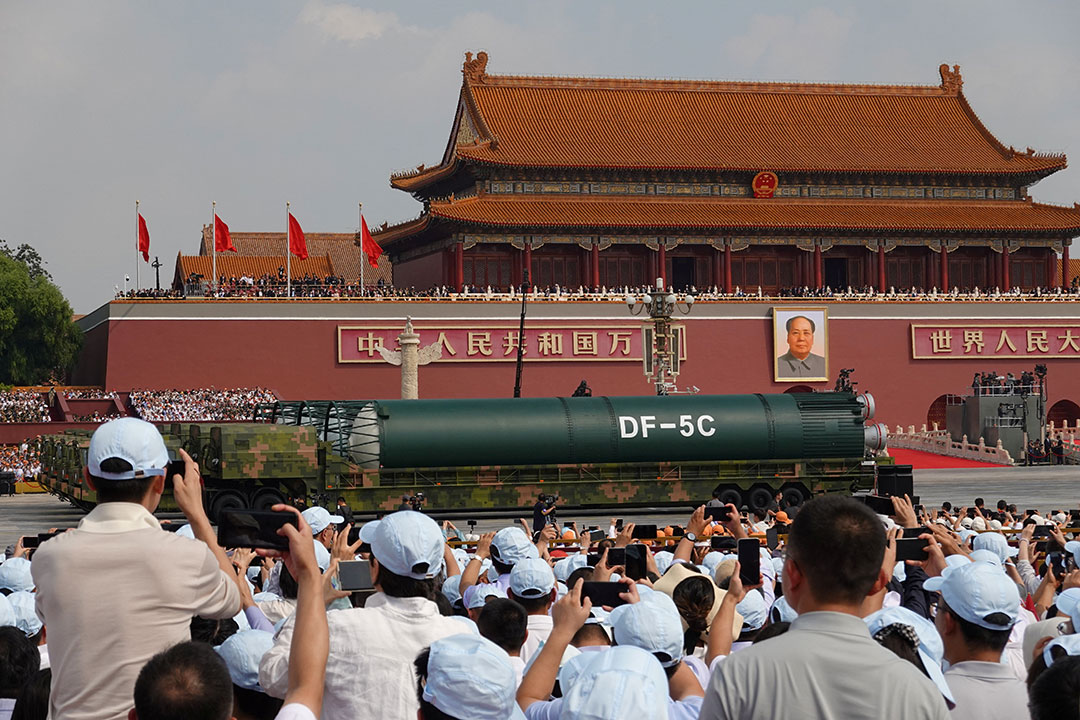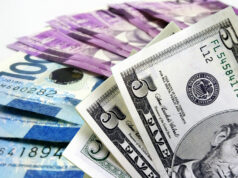China’s Xi projects power at military parade with Putin, Kim

BEIJING — Chinese President Xi Jinping warned the world was facing a choice between peace or war as he held his country’s largest-ever military parade on Wednesday, flanked by Russia’s Vladimir Putin and North Korea’s Kim Jong Un.
The lavish event to mark 80 years since Japan’s defeat at the end of World War II has been largely shunned by Western leaders, with Putin and Kim — pariahs in the West due to the Ukraine war and Mr. Kim’s nuclear ambitions — the guests of honor.
Designed to project China’s military might and diplomatic clout, it also comes as US President Donald J. Trump’s trade tariffs and volatile policymaking strain its relations with allies and rivals alike.
“Today, mankind is faced with the choice of peace or war, dialogue or confrontation, win-win or zero-sum,” Mr. Xi told a crowd of more than 50,000 spectators at Tiananmen Square, adding that the Chinese people “firmly stand on the right side of history.”
Riding in an open-top limousine, Mr. Xi then inspected the troops and cutting-edge military equipment such as missiles, tanks and drones on display.
Helicopters trailing large banners and fighter jets flew in formation above during the 70-minute showcase thick with symbolism and propaganda which culminated in the release of 80,000 peace doves and colorful balloons.
Donning a tunic suit in the style worn by former leader Mao Zedong, Mr. Xi earlier greeted more than 25 leaders on the red carpet, including Indonesia’s Prabowo Subianto who made a surprise appearance despite widespread protests at home.
Seated between Mr. Putin and Mr. Kim in the viewing gallery, Mr. Xi repeatedly engaged in conversations with both leaders as thousands of troops and materiel paraded before them. It marked the first time the trio have appeared together in public.
Mr. Putin later thanked his North Korean counterpart for his soldiers’ courageous fighting in the war in Ukraine during a bilateral meeting at China’s State Guesthouse. Mr. Kim said he was willing to do everything he can to help Russia.
Mr. Xi’s wife, Peng Liyuan, could be heard saying “Nice to meet you” and “Welcome to China” to several of the guests in English.
“Please give my warmest regards to Vladimir Putin, and Kim Jong Un, as you conspire against the United States of America,” Mr. Trump said in a post on Truth Social, as the event kicked off. He also highlighted the US role in helping China secure its freedom from Japan.
Mr. Trump had earlier told reporters he did not see the parade as a challenge to the United States. Japan’s top government spokesperson declined to comment on the parade, adding Asia’s top two economies were building “constructive relations.”
NEW GLOBAL ORDER
Mr. Xi has cast World War II as a major turning point in the “great rejuvenation of the Chinese nation,” in which it overcame the humiliation of Japan’s invasion to become an economic and geopolitical powerhouse.
Earlier this week, Mr. Xi unveiled his vision of a new global order at a regional security summit, calling for unity against “hegemonism and power politics,” a thinly veiled swipe at his rival across the Pacific Ocean.
“Xi feels confident that the table has turned. It’s China that is back in the driver’s seat now,” said Wen-Ti Sung, fellow at the Atlantic Council’s Global China Hub, based in Taiwan.
“It’s been Trumpian unilateralism rather than China’s wolf warrior diplomacy when people talk about the leading source of uncertainty in the international system,” he added.
Beyond the pomp, analysts are watching whether Mr. Xi, Mr. Putin and Mr. Kim may signal closer defense relations following a pact signed by Russia and North Korea in June 2024, and a similar alliance between Beijing and Pyongyang, an outcome that may alter the military calculus in the Asia-Pacific region.
Mr. Putin has already used the occasion to seal deeper energy deals with China, while the gathering has given Mr. Kim an opportunity to gain implicit support for his banned nuclear weapons.
Mr. Kim, debuting in his first major multilateral event, became the first North Korean to attend a Chinese military parade in 66 years.
He traveled to Beijing with his daughter Ju Ae, whom South Korean intelligence consider his most likely successor, although she was not seen alongside him at the parade.
IMPRESSIVE STRIDES
Over the past two years, more than a dozen generals — many formerly close to Mr. Xi — have been purged from the People’s Liberation Army (PLA) in a sweeping corruption crackdown.
“The parade allows Xi to focus the world’s attention on its impressive strides in modernizing its military hardware, while overshadowing the stubborn challenges afflicting the PLA, most notably the continued purges rolling through the ranks of its most senior officers,” said Jon Czin, a foreign policy analyst at Brookings Institution, a US-based think tank.
The parade was not only aimed at projecting China’s might to the outside world, but also galvanizing patriotic spirit at home, analysts said.
In his keynote address, Mr. Xi called the rejuvenation of the Chinese nation “unstoppable.” Civil servants up and down the country have been tasked with watching the parade and writing down their reflections, one of them told Reuters.
Nothing was left to chance for the milestone gathering.
Major roads and schools were closed in Beijing for the parade, the culmination of weeks of painstaking security preparations and midnight rehearsals.
Local governments nationwide mobilized tens of thousands of volunteers and Communist Party members to monitor for any signs of potential unrest around the parade, estimates based on online recruitment notices show. — Reuters



